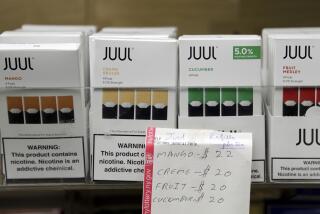Senate to Begin Hearings on Tobacco Settlement
- Share via
Formal congressional review of the $368.5-billion tobacco settlement will begin Thursday when the Senate Judiciary Committee holds its first hearing on the controversial deal, committee members disclosed Tuesday.
“It’s going to be the hottest national debate since slavery,” declared Mississippi attorney Richard Scruggs, whose firm represents close to 20 states that sued the industry seeking to recover tax money spent treating sick smokers.
Scruggs made the prediction while attending the annual conference of the National Assn. of Attorneys General in Jackson Hole, Wyo., on a day when there were several significant developments related to the settlement:
* Representatives of Mississippi, Florida and Texas said they would start negotiations in Washington today aimed at settling or staying their massive suits while Congress and the White House consider the settlement. Mississippi’s trial is scheduled to commence July 7, Florida’s on Aug. 4 and Texas’ on Sept. 29, and it has become apparent that it is highly unlikely that Congress will resolve this issue before late fall.
* A spokesman for former Surgeon General C. Everett Koop and former Food and Drug Administration Commissioner David Kessler said that a special advisory panel on tobacco policy co-chaired by the duo would release a draft report today. The White House said earlier this month that it would take no formal position on the settlement until the advisory panel submitted its report, expected to be completed in early July. Thus far, both Kessler and Koop have been highly critical of key elements of the settlement, though praising certain aspects of it.
* Liggett Chairman Bennett S. Lebow sent a letter to the attorneys general saying that the settlement “would kill” the company, which has about 2% of the U.S. market.
In March, in a stunning development, Liggett reached a separate settlement with 22 attorneys general in which the company admitted that nicotine was addictive and that cigarette companies targeted children. Lebow also agreed to turn over documents that could implicate the other cigarette companies in wrongdoing.
During the negotiations completed last week, several of the attorneys general and lawyers representing them lobbied to get Liggett some special protection under the agreement because of the help the company had given. But negotiators for the other companies adamantly opposed any such protection, and the attorneys general relented on this issue.
e In Jackson Hole, Mississippi Atty. Gen. Michael Moore took issue with critics who said the settlement is too soft on the industry and contains language that would make it difficult for the FDA to reduce nicotine levels in cigarettes.
The settlement calls for dramatically tougher warnings on cigarette packages, severe restrictions on industry marketing and advertising, and penalizing the industry if teen smoking does not drop by 30% in five years.
Moore also said that if Congress tried to modify the agreement significantly--a highly likely possibility at the moment--the settlement would die.
More to Read
Get the L.A. Times Politics newsletter
Deeply reported insights into legislation, politics and policy from Sacramento, Washington and beyond. In your inbox twice per week.
You may occasionally receive promotional content from the Los Angeles Times.










